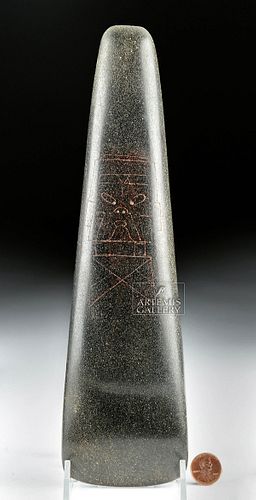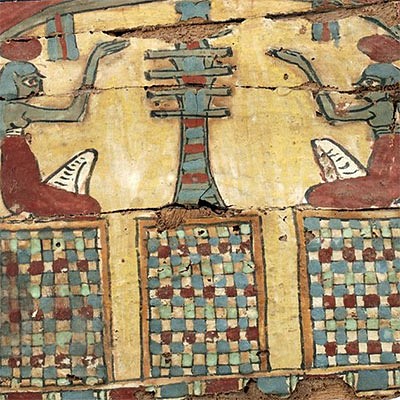Olmec Stone Celt with Incised Design
Lot 80a
About Seller
Artemis Fine Arts
686 S Taylor Ave, Ste 106
Louisville, CO 80027
United States
Selling antiquities, ancient and ethnographic art online since 1993, Artemis Gallery specializes in Classical Antiquities (Egyptian, Greek, Roman, Near Eastern), Asian, Pre-Columbian, African / Tribal / Oceanographic art. Our extensive inventory includes pottery, stone, metal, wood, glass and textil...Read more
Estimate:
$8,000 - $12,000
Absentee vs Live bid
Two ways to bid:
- Leave a max absentee bid and the platform will bid on your behalf up to your maximum bid during the live auction.
- Bid live during the auction and your bids will be submitted real-time to the auctioneer.
Bid Increments
| Price | Bid Increment |
|---|---|
| $0 | $25 |
| $300 | $50 |
| $1,000 | $100 |
| $2,000 | $250 |
| $5,000 | $500 |
| $10,000 | $1,000 |
| $20,000 | $2,500 |
| $50,000 | $5,000 |
| $100,000 | $10,000 |
| $200,000 | $20,000 |
About Auction
By Artemis Fine Arts
Jul 30, 2020
Set Reminder
2020-07-30 10:00:00
2020-07-30 10:00:00
America/New_York
Bidsquare
Bidsquare : Ancient / Ethnographic From Around the World
https://www.bidsquare.com/auctions/artemis-gallery/ancient-ethnographic-from-around-the-world-5382
Ancient art from Egypt, Greece, Italy and the Near East, as well as Asian, Pre-Columbian, Native American, African / Tribal / Oceanic, Spanish Colonial, Russian Icons, Fine art, much more! All categories, all price ranges... all legally acquired and guaranteed to be as described or your money back. Artemis Fine Arts info@artemisgallery.com
Ancient art from Egypt, Greece, Italy and the Near East, as well as Asian, Pre-Columbian, Native American, African / Tribal / Oceanic, Spanish Colonial, Russian Icons, Fine art, much more! All categories, all price ranges... all legally acquired and guaranteed to be as described or your money back. Artemis Fine Arts info@artemisgallery.com
- Lot Description
Pre-Columbian, southern Mexico/Guatemala, Olmec culture, ca. 1150 to 550 BCE. A ceremonial deep green stone hand axe (celt), one of its faces incised with fantastical iconography of a skull-like face. The thin incised lines are filled with pale red cinnabar pigment. The axe itself is teardrop-shaped, polished to a matte sheen, with a thick, almost cuboid stem and a gently sloping, dull blade end. Peter D. Joralemon, in his 1971 publication, "Studies in Pre-Columbian Art and Archaeology, Number 7, A Study in Olmec Iconography", has classified many of these stylistic motifs, and his work allows us to understand that these greenstone celts symbolized ears of corn (maize). Many are incised with iconography of the corn god, but this example draws on another Mesoamerican stylistic motif, that of the trophy head. Size: 2.9" W x 10.45" H (7.4 cm x 26.5 cm)
Artists in ancient Mesoamerica commonly depicted disembodied human heads which are probably meant to represent trophy heads. Although the Mesoamerican use of war as a tool for acquiring resources and consolidating control under specific leaders is the same as ours today, theirs also had a supernatural element to it. We believe that the taking of the head was seen as an organized form of violence related to shamanism, whose role was to protect the community from any evil, including disease and sorcery. If a shaman's head was taken, then due to his or her supernatural skills, it could still have power, even separated from the rest of the body. Looking at the fierce face on this axe head, the artist's belief in this power is clear.
Provenance: private Los Angeles County, California, USA collection, acquired by descent from the owner's father, collection amassed between 1950-1990
All items legal to buy/sell under U.S. Statute covering cultural patrimony Code 2600, CHAPTER 14, and are guaranteed to be as described or your money back.
A Certificate of Authenticity will accompany all winning bids.
We ship worldwide and handle all shipping in-house for your convenience.
#135328Light surface wear commensurate with age. Motifs are very well-preserved with nice remaining red cinnabar.Condition
- Shipping Info
-
All shipping is handled in-house for your convenience. Your invoice from Artemis Gallery will include shipping calculation instructions. If in doubt, please inquire BEFORE bidding for estimated shipping costs for individual items.
-
- Buyer's Premium



 EUR
EUR CAD
CAD AUD
AUD GBP
GBP MXN
MXN HKD
HKD CNY
CNY MYR
MYR SEK
SEK SGD
SGD CHF
CHF THB
THB














